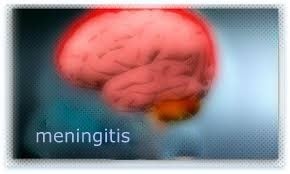Meningitis
Meningitis is an inflammation of the meninges; an inflammation of the protective layers to the brain. Septicaemia is the blood poisoning form of the disease. 
Often, there is a superimposed image of both encephalitis and meningitis, that is then referred to as meningo-encephalitis.
Meningitis can be caused by fungi, chemical irritation or drug allergies, and tumors.
One of the forms of bacterial meningitis is caused by a bacterium that lives in some people in the upper part of the respiratory tract. When these bacteria leave the respiratory tract and by the bloodstream reacht the meninges, a meningitis is caused.
Danger of swelling of the brain:
The brain is protected in the hard shell, the skull. When the brain swells by inflammation, the skull cannot be pressed away and makes the swollen brain to find a different direction.
This allows them to press down on the brain stem. From this section of the brain vital functions such as breathing and heart rate are controlled.
If this situation is left untreated, the intracranial pressure rises and the brainstem can cease to function, and the patient may die. Therefore it is important that medical action is taken soon.
Symptoms of Meningitis may include :
(high) fever, increasing headache, flu-like symptoms, nausea and vomiting, stiff neck (but sometimes missing!) sometimes skin lesions; purple red spots, and later sleepiness.
Long-term effects
If the acute hospital care period is over, many patients still have health complaints. The recovery may take weeks to months, even years to complete.
For some, the recovery takes longer and some will unfortunately no longer function at the old level. Younger patients may recover faster than older patients.
Both viral meningitis and bacterial meningitis may display in the first recovery period headaches as well as fatigue, memory problems, learning / concentration problems. Someone might not be able to function in large groups, not able to handle pressure or stress and can quickly be irritated.
Even epilepsy can be caused by a bacterial meningitis and hearing loss and hypersensitivity to light and sound are mentioned.
Especially after a pneumococcal meningitis a small number of patients may incur severe mental and physical retardation.
Also neuropsychological symptoms occur. (see lists below) Many mentioned memory problems, fatigue, headache, dizziness, concentration problems and headaches.
Meningitis in the course of the first year may cause Cerebral Palsy.
Possible sequelae after a viral infection (virus)
Headache
Dizziness
(extreme) Fatigue
Memory Problems
Balance Complaints
Concentration / learning disabilities
Behavioral / mood changes
Depression
Loss of weight
Sensitivity to light
Sensitive scalp for heat and cold
Possible sequelae after bacterial infection
Deafness
Headache
Fatigue
Impaired concentration
Learning Disabilities
Visual problems
Epilepsy
Memory Complaints
Faults in the motor
Dizziness
Balance disorders
Depression
General behavioral changes ( very quiet or very busy)
Sudden mood changes
Aggressive moods or tantrums
Anxiety Attacks